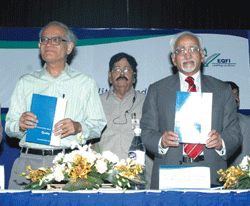The latest state of Elementary Education in India Report 2006-07 of the Delhi-based National University of Educational Planning and Administration (NUEPA), released on October 10, once again confirms the southern coastal state of Kerala (pop. 31.83 million) as India’s most educationally advanced state.
As per usual practice EEI 2006-07 ranks all of India’s 28 states and seven Union territories on its Education Development Index (EDI) which assesses primary and upper primary education in each state on the basis of 23 indicators grouped under four heads, viz. access, infrastructure, teachers and outcome indicators. The top five states in NUEPA’s EDI (maximum score 1) are Kerala (0.772), Delhi (0.757), Tamil Nadu (0.741), Himachal Pradesh (0.707) and Karnataka (0.680), with Bihar and Jharkhand at the bottom with aggregate ratings of 0.321 and 0.381 respectively.
Stating that “even the top ranking states are not perfect in case of all the four sets of indicators,” EEI 2006-07 warns under-performing states to raise teaching-learning standards without delay, noting that the bottom ranked states routinely cram 100 students into a class with teacher-pupil ratios averaging 1:67, which prompts teacher and student dropouts.
 The dismal conclusions of EEI 2006-07 — particularly in relation to educationally backward states — has prompted a national outcry. Vice-president Mohammed Hamid Ansari gave a call for establishing a national quality monitoring authority for elementary education. “Quality education needs to be demystified. We still have not been able to bring equitable education to people and vulnerable sections of society. Minorities, SCs and STs continue to remain out of the purview of good education,” said Ansari, a former vice-chancellor of Aligarh Muslim University, on October 13 while releasing a pilot study titled ‘Excellence in Schools’ conducted by Education Quality Foundation of India (EQFI), a not-for-profit organisation sponsored by the Delhi-based Educomp Solutions Ltd.
The dismal conclusions of EEI 2006-07 — particularly in relation to educationally backward states — has prompted a national outcry. Vice-president Mohammed Hamid Ansari gave a call for establishing a national quality monitoring authority for elementary education. “Quality education needs to be demystified. We still have not been able to bring equitable education to people and vulnerable sections of society. Minorities, SCs and STs continue to remain out of the purview of good education,” said Ansari, a former vice-chancellor of Aligarh Muslim University, on October 13 while releasing a pilot study titled ‘Excellence in Schools’ conducted by Education Quality Foundation of India (EQFI), a not-for-profit organisation sponsored by the Delhi-based Educomp Solutions Ltd.
Also speaking on the occasion, NCERT director Dr. Krishna Kumar expressed apprehension about the spreading CCTV culture in school education. “It is the freedom to learn in a teacher’s presence and punctuality and good behaviour of students in classrooms that is a quality dimension fostering human values. Teaching is a relational activity and let’s not forget quality is also a measure of the basic character of education,” said Kumar.
EQFI’s study of 90 private and government schools indicates teacher indifference, if not resistance, to training inputs. “While 90 percent of the schools sent teachers to training workshops, only 35 percent have a planned teacher training policy. Also, though most schools request teacher training material, they fail to convert it into useful information,” says Anuradha Sen, director (academics), EQFI.
While poor teacher quality and abysmal learning outcomes issues continue to raise their heads, the India office of Unicef, the international children’s agency, has scripted several high-potential initiatives being implemented in Tamil Nadu, UP, Jharkhand and Bihar. Among them: low writing tables for children to improve writing skills and changing the traditional way of sitting and writing in oblique postures. “We’re doing terrible things to children and never see the world through their eyes. This is an age of coalitions and partnerships, so Unicef is extending a helping hand. We work in micro settings, examine the environment and provide the initial impetus for changing learning environments,” says Samphe D. Lhalungpa, chief education officer of Unicef India.
Indeed there is renewed focus on the critical role of teachers — especially government school teachers — who are obstinately training resistant and despite being better paid than private school teachers are notorious for high absenteeism. Comments M.A. Siddiqui, chairman of the National Council for Teacher Education (NCTE): “The teacher training curriculum needs a complete revisit. Now we’ve entered the phase where the centrality of pedagogy is being recognised as a quality dimension.”
Adds Meera Bala Chandran director of EQFI: “The organisational weaknesses of schools are a major cause of low learning achievement. Education processes need to be assessed, corrected, strengthened and improved to achieve quality.”
Autar Nehru (Delhi)